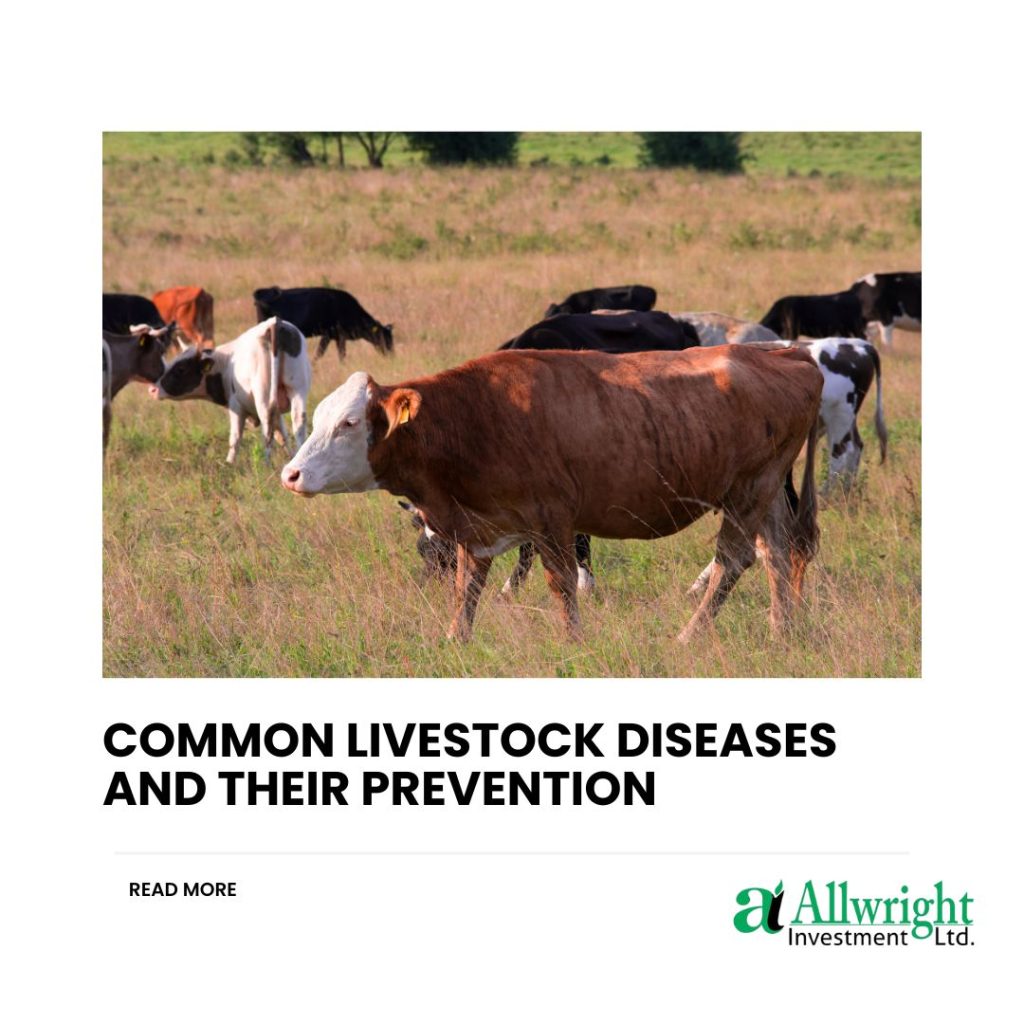As a farmer or livestock owner, one of the most important things you can do is to keep your animals healthy. Healthy animals are productive animals, and preventing disease outbreaks is crucial for animal welfare. Let’s look at some common livestock diseases and how you can take proactive steps to prevent them.
1. Foot and Mouth Disease (FMD): Foot and mouth disease is a highly contagious virus that affects animals like cows, goats, pigs, and sheep. It spreads quickly from one animal to another, especially in crowded places like farms.
Symptoms: Fever, blisters on the mouth and feet, lameness, reduced appetite.
Prevention:
- Keep your farm clean by regularly removing manure and dirt.
- Limit visitors to your farm and make sure they clean their shoes before entering.
- Vaccinate your animals against FMD. It’s like giving them a superhero shield against the virus!
2. Bovine Respiratory Disease (BRD): BRD is like a bad cold for cows. It can make them cough, have trouble breathing, and even lose their appetite. This disease is caused by bacteria, viruses, and sometimes even tiny bugs called parasites.
Symptoms: Coughing, fever, nasal discharge, pneumonia.
Prevention:
- Keep your cows warm and dry, especially during chilly weather.
- Make sure they have plenty of fresh air and space to move around.
- Feed them a balanced diet to keep their immune system strong.
3. Parasitic Infections: Parasites are tiny creatures that live on or inside your animals and make them sick. Some common parasites include worms and ticks.
Symptoms: Diarrhea, weight loss, anemia, potbellied appearance.
Prevention:
- Regularly deworm your animals to get rid of any unwanted guests.
- Use insect repellents or special treatments to keep ticks away.
- Keep their living areas clean and tidy.
4. Mastitis: Mastitis is an infection in the udder of cows, making it sore and swollen. It can be caused by bacteria entering the udder through tiny cracks in the skin.
Symptoms: Swollen, red udder, abnormal milk (pus, blood).
Prevention:
- Make sure your cows have clean and comfortable bedding.
- Practice good milking hygiene by washing your hands and the udder before milking.
- Check your cows regularly for any signs of mastitis, like swelling or redness.
5. African Swine Fever (ASF): ASF is a highly contagious viral disease that affects domestic and wild pigs, causing high fever, weakness, and hemorrhages.
Symptoms: High fever, lethargy, loss of appetite, red blotches on the skin, internal bleeding.
Prevention:
- Practice strict biosecurity measures to prevent the introduction of ASF onto your farm.
- Monitor pigs for any signs of illness and isolate suspected cases immediately.
- Educate farm staff about the importance of biosecurity and disease prevention protocols.
6. Brucellosis: This is a bacterial infection that can affect cattle, pigs, and goats, sheep leading to reproductive issues and health complications.
Symptoms: Fever, weight loss, abortions, infertility.
Prevention:
- Implement vaccination programs recommended by veterinarians to control brucellosis.
- Practice proper sanitation and hygiene measures to prevent the spread of the bacteria.
- Quarantine and test new animals before introducing them to your existing herd and removal of infected animals.
7. Bloat: This is a rapid buildup of gas in the rumen (first stomach) of ruminant animals (cattle, sheep, goats) that can be fatal if not treated quickly.
Symptoms: Distended abdomen, difficulty breathing, restlessness.
Prevention:
- Gradual introduction to new pastures
- Avoid feeding during the hottest part of the day
- Providing access to roughage such as hay, straw can help prevent bloat.
Remember, early detection and timely intervention are crucial in mitigating the impact of diseases on livestock populations.
Allwright Investment is here to work with you to create healthier environments for your cherished animals and ensure the sustainability of our farming practices.


Leave a comment
You must be logged in to post a comment.